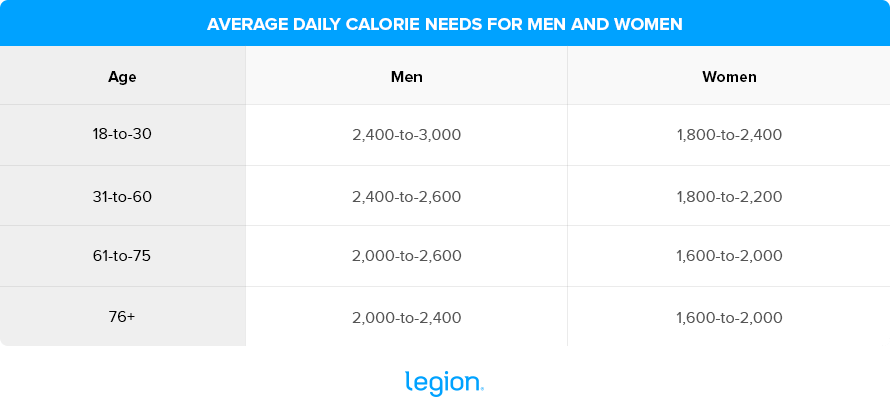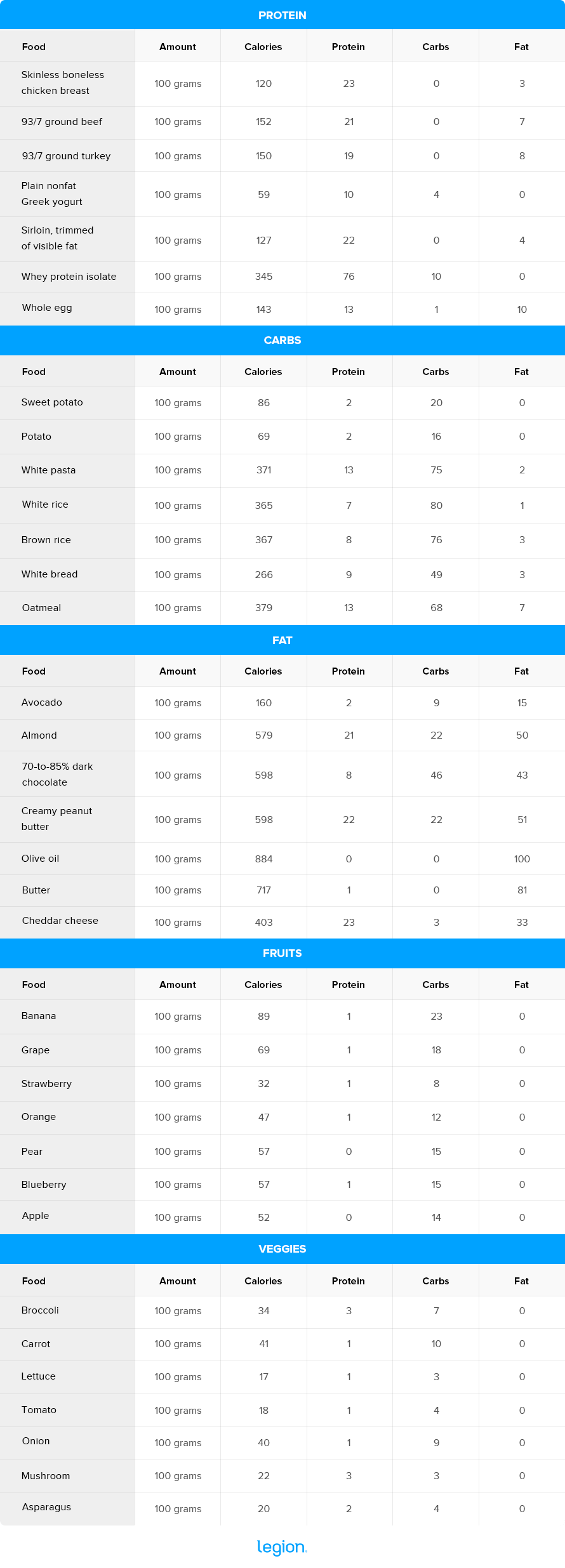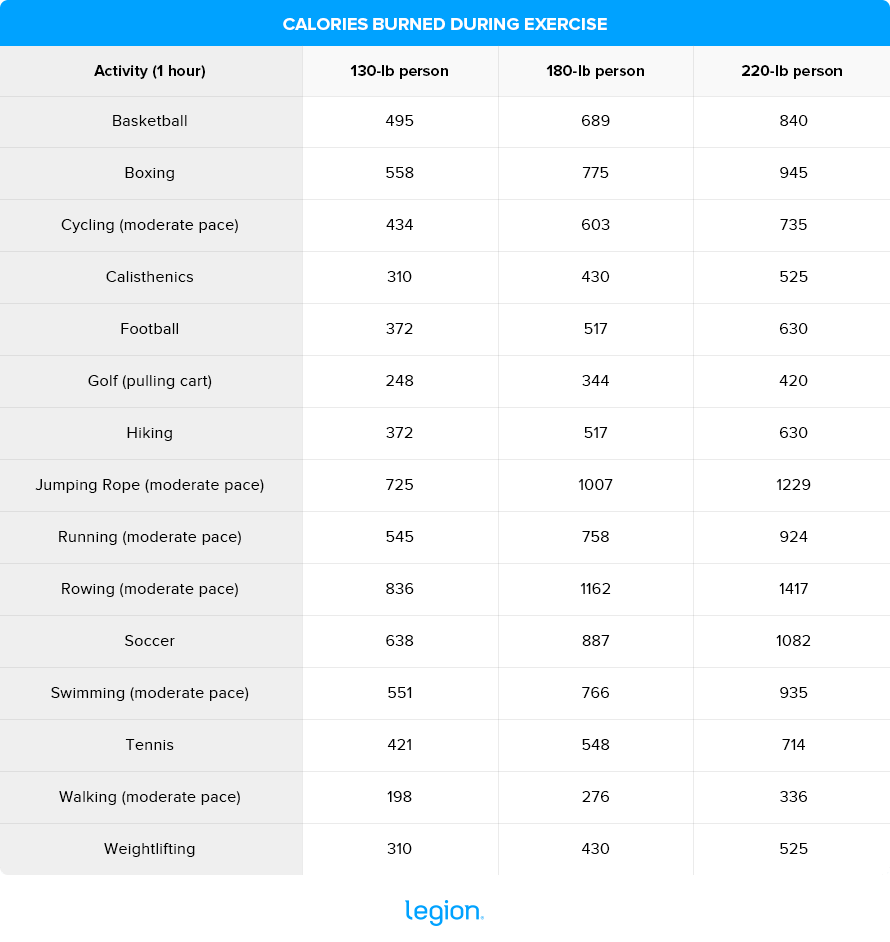Whether starting a weight-loss diet, bulking to build muscle, or looking to maintain your current physique, you’ve probably asked yourself, “How many calories should I eat?”
To learn the answer, enter your details into the Legion Calorie Calculator below.
Our calorie calculator defaults to the Mifflin-St Jeor equation, a highly accurate method of calculating caloric needs.
If you prefer to crunch the number manually over using the calorie calculator, use the Mifflin-St Jeor equation outlined below to determine your basal metabolic rate (BMR)—the average daily calories your body needs to carry out essential functions such as breathing, circulating blood, producing hormones, and so forth.
For men: BMR = 10 x weight (kg) + 6.25 x height (cm) – 5 x age (years) + 5
For women: BMR = 10 x weight (kg) + 6.25 x height (cm) – 5 age (years) – 161
To convert your BMR into your total daily energy expenditure (the total number of calories your body burns each day, also called your “TDEE”), multiply your BMR by the corresponding number below, according to your level of physical activity:
- Sedentary: 1.2
- Lightly Active: 1.375
- Moderately Active: 1.550
- Very Active: 1.725
- Extra Active: 1.9
Finally, adjust the number you get based on your goals.
To understand how many calories should I eat to lose weight, trim your calorie intake by 20-to-25%.
For example, if your TDEE is 2,000 calories, and you want to lose weight quickly, reduce 2,000 by 25% to arrive at a daily calorie target of 1,500 calories.
Conversely, to gain weight, increase your calories by 5-to-10%.
For example, if your TDEE is 2,000 calories, and you want to gain weight quickly, increase 2,000 by 10% to arrive at a daily calorie target of 2,200 calories.
How Many Calories Should I Eat?
Your calorie needs depend on your sex, age, height, weight, and physical activity level.
For instance, a tall, young, muscular, active man will require more calories than a petite, overweight, older woman who only does sporadic light activity.
According to the U.S. Department of Agriculture’s (USDA’s) 2020–2025 Dietary Guidelines, the average daily caloric needs for men and women are as follows:

While these estimates serve as a starting point, you’ll want to track your calorie intake more closely for effective weight loss, gain, or maintenance.
Here’s what you need to do.
How to Use A Calorie Calculator to Lose Weight
To lose weight, you need to eat fewer calories than your body burns every day (also known as a “calorie deficit”).
To do this, use the Legion Calorie Deficit Calculator to estimate your total daily energy expenditure (TDEE) based on your gender, weight, height, age, and physical activity level.
Then, create a calorie deficit by consuming 20-to-25% fewer calories daily (20-to-25% less than your TDEE) or following our suggestions for slow, moderate, and fast fat loss in the “Calories to lose weight” section beneath the calorie calculator.
To accelerate fat loss and maximize muscle retention while dieting, you should also do the following:
- Do 3-to-5 strength training workouts weekly: This boosts the number of calories you burn and supports muscle retention, which is key to maintaining metabolic health and keeping weight off post-diet.
- Eat 1-to-1.2 grams of protein per pound of body weight per day: This enhances workout recovery, accelerates fat loss, bolsters muscle retention, and increases satiety, reducing the likelihood of overeating.
How to Use A Calorie Calculator to Gain Weight
Counting calories isn’t only for weight loss—it’s also a powerful tool for gaining weight and muscle.
Rather than mindlessly consuming a fixed number of calories, like 3,000 or 3,500 calories per day, a smarter strategy to understand how many calories I should eat to gain muscle while minimizing fat gain is to use the Legion Calorie Calculator to determine your TDEE.
Once you’ve established this figure, consume 5-to-10% more calories than your daily expenditure or follow the guidelines for slow, moderate, and fast weight gain in the “Calories to gain weight” section beneath the calorie calculator.
How to Use A Calorie Calculator to Maintain Weight
The Legion Calorie Calculator also doubles as a maintenance calorie calculator. That is, you can use it to calculate how many calories you should eat per day to maintain your weight.
To use it as a maintenance calorie calculator, enter your data to calculate your TDEE, then use this as your daily calorie target.
What to Eat to Reach Your Goal Weight
Learning “How many calories should I eat?” using our calorie calculator is the first step toward reaching your goal weight. But as I explain in my fitness books for men and women, it’s equally important to focus on what you eat.
And that means you should look to get most of your daily calories from whole, minimally processed food.
Here are some good examples of food to include in your diet:
- Protein: Meat, fish, eggs, high-protein dairy products, soy, and whey, casein, and plant-based protein powders.
- Carbohydrates: Fruits, vegetables, whole grains (brown rice, corn, oats, quinoa, barley), legumes (beans and peas), and tubers (potatoes and other root vegetables).
- Fat: Plant oils, nuts, seeds, and avocados.
Combine the insights from our calorie calculator with these nutritious food choices to effectively reach and maintain your goal weight.
Calories in Common Diet Foods
Now that you know the types of foods you should aim to eat while dieting, it’s helpful to understand their calorie contents.
Here’s the calorie content of some common diet staples and how many grams of protein, carbs, and fat each contains:

Calories Burned During Exercise
Here’s the average number of calories you burn doing common exercises based on your body weight.

FAQ #1: What is the best calorie calculator?
If you don’t know your body fat percentage, the Mifflin-St Jeor calorie calculator equation tends to produce the most accurate results.
If you know your body fat percentage, the Katch-McArdle equation is the most accurate.
The Harris-Benedict equation isn’t as accurate as the previous two, but we provided it because it’s a well-known and popular formula.
FAQ #2: Why am I not losing weight?
There are several potential culprits for a lack of weight loss, with the most common ones being:
- You’re gaining muscle while losing fat. This is called recomping. In this case, don’t worry about your lack of weight loss—things are still moving in the right direction.
- You’re eating more than you think. In this case, you need to be more strict about tracking your calorie intake and/or reduce your calorie intake by 100 calories or so per day.
- You’re not burning as much energy as you think and are no longer in a large enough deficit to cause meaningful weight loss. In this case, add a session or two of cardio to your weekly regimen or walk more throughout the week.
FAQ #3: How can a maintenance calorie calculator help me maintain my weight?
A maintenance calorie calculator tells you how many calories you burn daily based on your age, gender, weight, height, and activity level.
By matching your calorie intake with the target from the maintenance calorie calculator, you can maintain your weight effectively—avoiding weight gain by overeating or weight loss through under-eating.
Additionally, a maintenance calorie calculator helps you make informed adjustments. For instance, if you start a new exercise routine or undergo lifestyle changes, a maintenance calorie calculator can help reassess your caloric needs to maintain your weight effectively.
Scientific References +
- Phillips, Stuart M., and Luc J.C. Van Loon. “Dietary Protein for Athletes: From Requirements to Optimum Adaptation.” Journal of Sports Sciences, vol. 29, no. sup1, Jan. 2011, pp. S29–S38, www.tandfonline.com/doi/full/10.1080/02640414.2011.619204, https://doi.org/10.1080/02640414.2011.619204.
- Evans, Ellen M, et al. “Effects of Protein Intake and Gender on Body Composition Changes: A Randomized Clinical Weight Loss Trial.” Nutrition & Metabolism, vol. 9, no. 22691622, 12 June 2012, p. 55, www.ncbi.nlm.nih.gov/pmc/articles/PMC3407769/, https://doi.org/10.1186/1743-7075-9-55. Accessed 6 Oct. 2020.
- Helms, Eric R, et al. “Evidence-Based Recommendations for Natural Bodybuilding Contest Preparation: Nutrition and Supplementation.” Journal of the International Society of Sports Nutrition, vol. 11, no. 1, 12 May 2014, www.ncbi.nlm.nih.gov/pmc/articles/PMC4033492/, https://doi.org/10.1186/1550-2783-11-20.
- Halton, Thomas L., and Frank B. Hu. “The Effects of High Protein Diets on Thermogenesis, Satiety and Weight Loss: A Critical Review.” Journal of the American College of Nutrition, vol. 23, no. 5, Oct. 2004, pp. 373–385, https://doi.org/10.1080/07315724.2004.10719381.
- Jetté, M, et al. “Metabolic Equivalents (METS) in Exercise Testing, Exercise Prescription, and Evaluation of Functional Capacity.” Clinical Cardiology, vol. 13, no. 8, 1990, pp. 555–65, www.ncbi.nlm.nih.gov/pubmed/2204507/, https://doi.org/10.1002/clc.4960130809.
- Amirkalali, Bahareh, et al. “Comparison of Harris Benedict and Mifflin-ST Jeor Equations with Indirect Calorimetry in Evaluating Resting Energy Expenditure.” Indian Journal of Medical Sciences, vol. 62, no. 7, 1 July 2008, pp. 283–290, pubmed.ncbi.nlm.nih.gov/18688113/.













